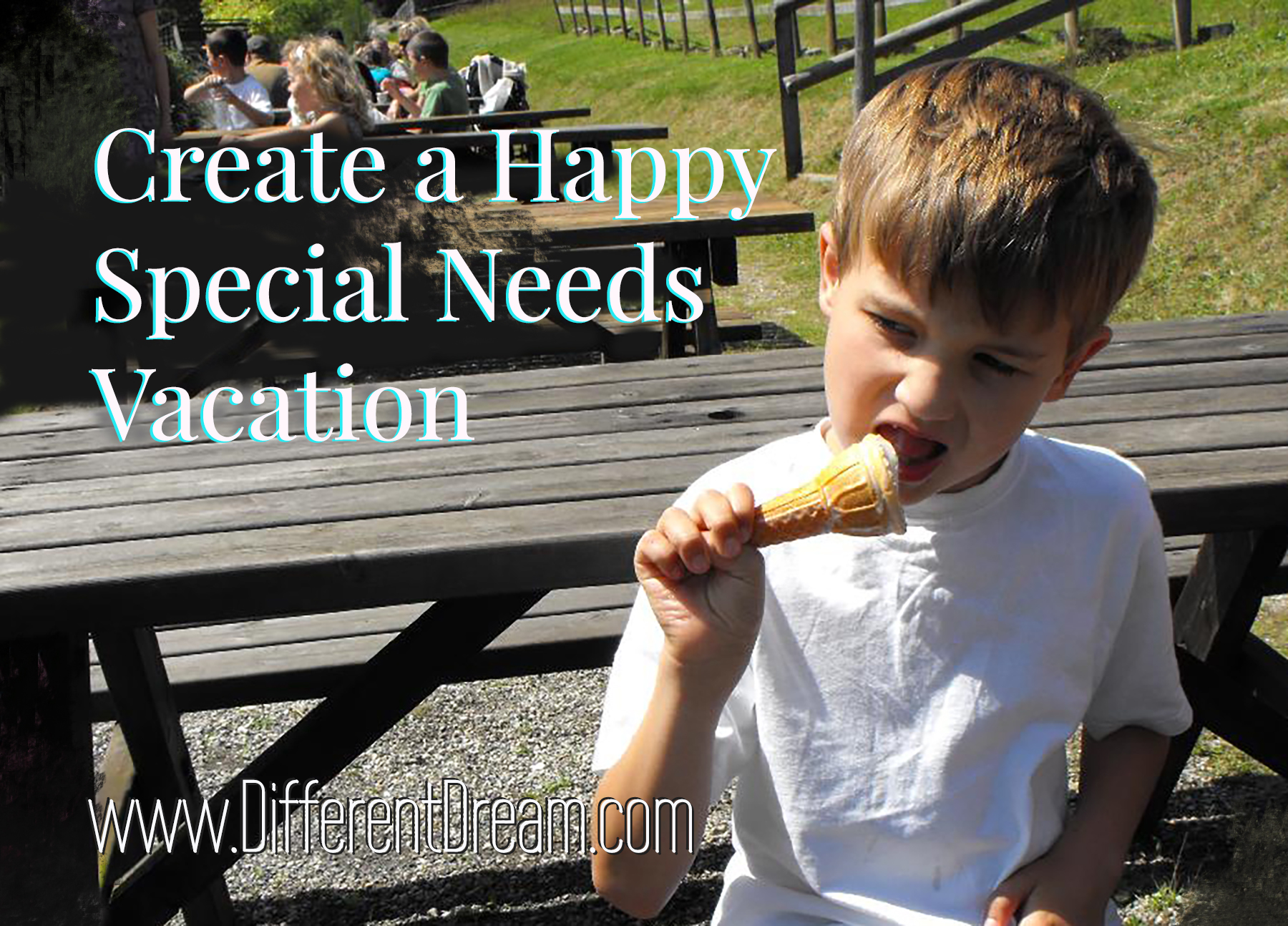10 Tips for a Successful Special Needs Vacation

Mark Arnold’s guest post offers 10 tips for a successful special needs vacation. He and his family tested them this summer for you to use whenever you and yours are able to get away.
So, what do we need to do to prepare our special needs children and young people for vacations overseas, in their home country, or as a staycation? These 10 tips for a successful vacation can help.
Tip #1: Allow for Processing Time
While the attraction of late vacation deals can be tempting, deciding at the last minute can be difficult. Some children and young people need processing time to prepare for a significant change, so plan as far in advance as you can.
Tip #2: List Issues Your Child May Face
Think about everything from the packing to traveling, from where you will stay and sleep to the things you will do, from the people going with you to those you might meet, from the food will eat to transportation you will take. What are the issues for your special needs child or young person? List them and think about how to reduce their impact. For example, if food’s an issue, contact the holiday provider and request a special menu. Or you take favorite food items with you.
Tip #3: Create a Social Story
A social story uses photos, symbols, and words to explain something new or complex for a child or young person with special needs. You can create one about what your child or young person needs to know, about the upcoming vacation. This gives them the tools to understand what will happen. Resources about social stories can be found at the Reachout ASC website.
Tip #4: Create a Visual Timetable
Create a daily plan. Use symbols or photos to represent each aspect of the day. Attach them using Velcro, so they can move along the timetable as the day progresses to aid understanding of what is happening now, next, and so forth. There’s a visual timetable template on the Reachout ASC website above.
Tip #5: Take Favorite Items
Take favorite toys or items your child or young person uses to feel safe and secure. Pack them in your carry-on baggage so they don’t get lost! You could also introduce a new item to take on vacation—something related to your destination. The item could be a vacation mascot and your child could have the job of looking after it.
Tip #6: Conduct a Dry Run
If you are flying and the airport you are going to isn’t far away, conduct a dry run. Most airports have special assistance for families traveling with a child or young person with special needs. It’s worth exploring what they provide. Look at where everything is. Airlines are supportive, but it’s wise ask for assistance in advance.
Tip #7: Bring Things to Do
While traveling, there will be long periods with little to do. Take activities to fill these gaps. Depending on your child’s interests, take coloring books, books to look at or read, fidget toys, Legos, a tablet to watch or listen to, or whatever helps them fill the time and relieve boredom.
Tip #8: List the Essentials
We usually remember important things like tickets, passport, money, and phones. It’s wise to also list other essentials such as medications and be sure you bring enough along. List snacks and drinks and take plenty in case you get stuck in a huge traffic jam or at the airport.
Tip #9: Involve Your Child or Young Person in Planning
If possible, seek your child or young person’s input. Ask what they’re worried about, what they want to take to feel safe, what resources help them feel in control. The more you talk about the vacation and work through any fears, the more likely the trip will be successful.
Tip #10: A Staycation is a Good Option
If the complexities of going somewhere else are too great, plan a staycation instead. You can have a wonderful time staying local and exploring what’s on offer close to home. And everyone gets to sleep in their own bed at night!
Whatever you are hoping to do for vacation, these 10 tips for a successful special needs vacation can make it less stressful and more fun.
Do you like what you see at DifferentDream.com? You can receive more great content by subscribing to the monthly Different Dream newsletter and signing up for the daily RSS feed delivered to your email.
By Mark Arnold
Mark Arnold is the Additional Needs Ministry Director at Urban Saints, a leading national Christian children’s and youth organization. He is co-founder of the Additional Needs Alliance, a national and international advocate for children and young people with additional needs or disabilities. Mark is a Churches for All and Living Fully Network partner, a member of the Council for Disabled Children and the European Disability Network. He writes an additional needs column for Premier Youth and Children’s Work (YCW) magazine and blogs at The Additional Needs Blogfather. He is father to James, who has autism spectrum condition, associated learning disability, and epilepsy. To find out more about how Mark’s work can help you, contact him at: marnold@urbansaints.org or @Mark_J_Arnold
Subscribe for Updates from Jolene
Related Posts
Why Did God Make Me this Way?
Guest blogger Steve Siler tells the story of his answer to his son’s question: “Why did God make me this way?”
Can Churches Help Families Raising Children with Disabilities Stay Together?
Can churches help families raising children with disabilities stay together? Guest blogger Mark Arnold explains his opinion.
The Physical Manifestations of Grief in Caregivers
Jolene explains how the heaviness of loss and sorrow can contribute to the physical manifestations of grief in caregivers.






0 Comments